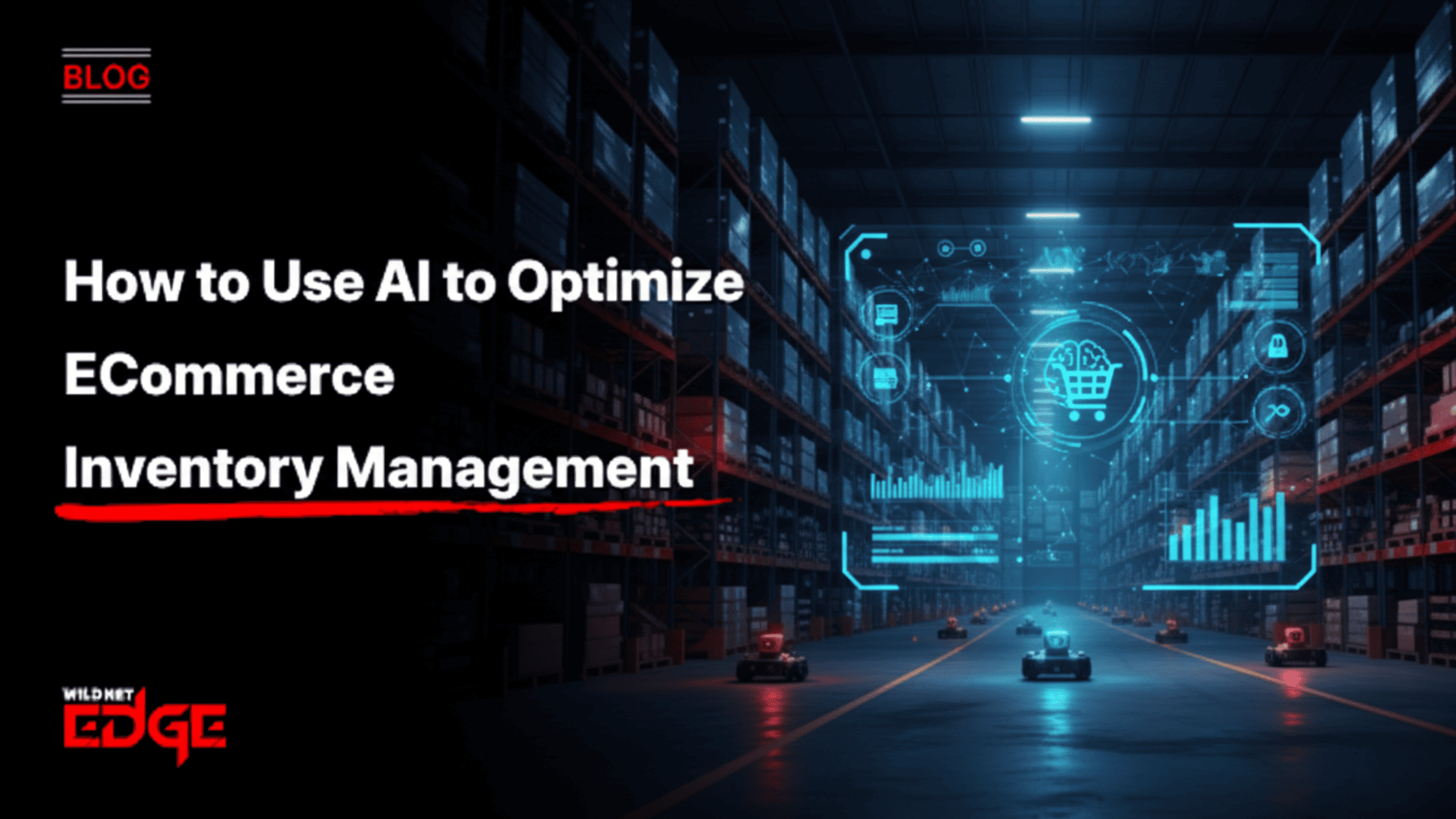TL;DR
This article explores how AI transforms eCommerce inventory management from reactive control to predictive, proactive strategies. Key benefits include accurate demand forecasting, dynamic pricing, and warehouse optimization, helping retailers reduce overstock, prevent stockouts, and improve efficiency.
For any eCommerce business, inventory is a delicate and expensive balancing act. Holding too much stock ties up your capital and increases carrying costs. Holding too little leads to stockouts, lost sales, and frustrated customers who may never return. Traditional inventory management, often based on historical averages and guesswork, is no longer sufficient today. The solution is a more innovative, predictive approach: leveraging AI in eCommerce inventory management.
What is AI in eCommerce Inventory Management?
AI in eCommerce inventory refers to using artificial intelligence and machine learning algorithms to automate and optimize stock management. Instead of relying on simple, static rules, AI systems can analyze vast and complex datasets to make highly accurate predictions about future demand.
This technology acts as an intelligent brain for your supply chain. It considers not just your past sales data, but also external factors like market trends, competitor pricing, upcoming holidays, and even weather patterns. This allows you to move from a reactive model of ordering stock to a proactive one, ensuring you have the right products, in the right quantity, at the right time. These advanced stock management solutions are a core component of modern Ecommerce Development Services.
The Core Business Benefits of an AI-Powered Approach
Implementing an AI-driven strategy is a direct investment in your company’s profitability and efficiency.
Highly Accurate Demand Forecasting
This is the most powerful benefit. AI models can analyze complex variables to predict future sales with a level of accuracy that is impossible to achieve with manual methods. This incredible foresight is the key to preventing both overstocking and stockouts. It ensures your capital is invested in the products that will actually sell, maximizing your revenue and improving your cash flow.
Reduced Holding Costs and Waste
Every item in your warehouse costs you money in storage, insurance, and potential obsolescence. By forecasting demand more accurately, AI helps you maintain a leaner inventory. This significantly reduces your carrying costs. For businesses with perishable or seasonal goods, it also dramatically reduces the financial losses associated with unsold or expired stock.
Increased Sales and Customer Satisfaction
Stockouts are silent killers of revenue and loyalty. When a customer is ready to buy but finds the item is unavailable, you have not only lost that sale but have also created a negative brand experience. AI-powered stock management solutions ensure your most popular items are always available, which directly translates to higher sales and happier, more loyal customers.
Key Applications of AI Inventory Automation
The applications of AI in eCommerce inventory are practical and deliver immediate results.
Dynamic Pricing Strategies
AI can analyze demand, competitor pricing, and inventory levels in real-time to suggest optimal pricing for your products. For example, it can automatically lower the price of an item with excess stock to move it faster or slightly increase the price of a high-demand item to maximize profit margins.
Automated Purchase Order Generation
Based on its demand forecasts, an AI system can automatically generate and even send purchase orders to your suppliers. This level of AI inventory automation eliminates manual work, reduces the risk of human error, and ensures your reordering process is perfectly timed.
Warehouse and Fulfillment Optimization
AI can also optimize the physical layout of your warehouse. By analyzing order data, it can suggest the most efficient placement of products to minimize the time it takes for your team to pick and pack orders. This speeds up your fulfillment process and lowers your labor costs.
Our AI Inventory Solutions in Action: Case Studies
Case Study 1: A Fashion Retailer’s Seasonal Stocking
- The Challenge: A fast-fashion retailer was constantly struggling with seasonal inventory. They would either run out of popular summer items in July or be left with a mountain of unsold winter coats in March.
- Our Solution: As their chosen AI Automation Agency, we built a custom demand forecasting model. The AI analyzed past sales data, current social media trends, and even long-range weather forecasts to predict demand for thousands of different SKUs.
- The Result: The retailer reduced their end-of-season overstock by 40% and improved their in-stock availability for popular items by 30%. The accurate forecasting led to a significant increase in profitability and a reduction in costly markdowns.
Case Study 2: An Electronics Store’s Dynamic Pricing
- The Challenge: An online electronics store was in a highly competitive market where prices changed daily. Their manual process for updating prices was slow and often left them uncompetitive.
- Our Solution: We developed an AI-powered dynamic pricing engine. The system monitored competitor prices and current inventory levels to automatically adjust the prices of thousands of products, all within parameters set by the management team.
- The Result: The company saw a 12% increase in its overall profit margin. The AI inventory automation allowed them to remain competitive on high-volume items while maximizing profit on their exclusive products, a clear win for their bottom line.
Our Technology Stack for AI in Inventory
We use a modern, scalable stack to build intelligent stock management solutions.
- AI & Machine Learning: TensorFlow, PyTorch, Scikit-learn, Prophet
- Data Processing & Analytics: Apache Spark, Databricks, Python (Pandas)
- Cloud Platforms: AWS, Google Cloud, Microsoft Azure
- Databases: Snowflake, Google BigQuery, PostgreSQL
- BI & Visualization: Tableau, Power BI
Conclusion
AI in eCommerce inventory is about replacing guesswork with data-driven intelligence. It is the most powerful tool available for creating a lean, efficient, and highly profitable retail operation. By embracing AI inventory automation, you can reduce costs, maximize sales, and build a more resilient business that is ready for the future.
Ready to unlock the power of predictive insights for your business? At Wildnet Edge, our AI-first approach to creating Custom Software Solutions ensures we build systems that are not only automated but also intelligent, providing a sustainable competitive advantage.
FAQs
While more data is always better, a good starting point is typically at least one to two years of clean sales data. This provides enough information for the AI model to identify seasonal patterns and trends.
Not necessarily. Most systems are designed to be a “human-in-the-loop” solution. The AI will provide a highly accurate recommendation for a purchase order, but a manager makes the final approval. This combines the power of AI with human expertise.
You can improve accuracy by including data from your marketing calendar, competitor pricing data, and external factors like public holidays or major industry events. The more context the AI has, the brighter it becomes.
Yes. AI can analyze return data to identify products with high defect rates or common issues. This insight can be fed back to your product development and procurement teams to improve product quality and reduce future returns.
Off-the-shelf tools are a great start, but they use generic models. A custom solution can be trained on your unique data and tailored to the specific variables that affect your business, which often results in a much more accurate and effective forecasting model.
An AI Application Assistant can provide a conversational interface for your team. A warehouse manager could simply ask, “What are our top 10 products at risk of a stockout next week?” and get an instant, data-driven answer.
The first step is a data audit. You need to assess the quality and accessibility of your current sales and inventory data. A clear understanding of your data landscape is the essential foundation for any successful AI in eCommerce inventory project.

Managing Director (MD) Nitin Agarwal is a veteran in custom software development. He is fascinated by how software can turn ideas into real-world solutions. With extensive experience designing scalable and efficient systems, he focuses on creating software that delivers tangible results. Nitin enjoys exploring emerging technologies, taking on challenging projects, and mentoring teams to bring ideas to life. He believes that good software is not just about code; it’s about understanding problems and creating value for users. For him, great software combines thoughtful design, clever engineering, and a clear understanding of the problems it’s meant to solve.
 sales@wildnetedge.com
sales@wildnetedge.com +1 (212) 901 8616
+1 (212) 901 8616 +1 (437) 225-7733
+1 (437) 225-7733
















 AI Development Services
AI Development Services Industry AI Solutions
Industry AI Solutions AI Consulting & Research
AI Consulting & Research Automation & Intelligence
Automation & Intelligence













